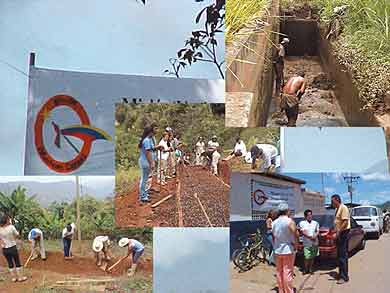This year, the ministry of Popular Economy has trained, through the Vuelvan Caras Mission, a total of 358,316 Venezuelans from the poor sectors of the population, and has provided them with the tools to establish new cooperatives and micro-businesses.

The creation of new businesses and cooperatives as a mechanism to curb poverty and unemployment is the objective of the Vuelvan Caras governmental mission. The minister of Popular Economy, Elías Jaua informed that this program has trained 358,316 participants, called lanceros by president Hugo Chávez (after the fierce, barefooted mestizo lancers who fought in the war of independence); in productive activities like agriculture, services, construction, tourism, textile and clothing, transportation, and arts and crafts.
As an incentive additional to training, the government grants scholarships to the trainees of low income. So far, 228,065 participants have been granted a monthly economic aid of 186,000 bolívares (approximately 97 U$ at the official rate of 1920 bolívares per dollar).
This year, the government invested 400 billion bolívares in these aids.
After an evaluation of the program, said minister Jaua, it was necessary to create a special fund to finance social costs, including medical assistance; and to incorporate new trainees. With this purpose, he announced that 10% of the 186,000 bolívares scholarship will be deducted and deposited in a trusteeship administered by the Banco Nacional de Desarrollo (Bandes: National Development Bank), a state institution.
“Our intention is to generate solidarity values. The Vuelvan Caras Mission does not have the sole purpose of granting scholarships. It is intended to train the lanceros so that they can establish their cooperatives and small businesses in order to become productive and thus help their communities”, said the official.
He explained that the 10% discount will sum up 7 billion bolívares, and said that there will be a monthly report on what is being done with these resources.
The goal is to incorporate 1.2 million citizens, that are currently unemployed, into the labor force. They would become new businessmen or employees in key areas for the development of the country , affirmed Jaua.
Although barely 358,316 lanceros have registered for the Vuelvan Caras Mission, the minister explained that the citizens that are now in the Robinson Mission, intended by the government to reduce illiteracy index and to provide elementary education to the poor; will also join Vuelvan Caras.
He explained that upon graduation, the Vuelvan Caras Mission students are oriented into establishing cooperatives or small businesses, and undertaking a productive activity. So far, there are 33,933 cooperatives in the country: 3,463 in transportation; 17,162, in goods and services; 918 in the production of goods for consumption; 341 in credits and loan, and 1,336 in social services.
Currently, this ministry has 50 million U$ available for the Vuelvan Caras Mission. Next year, the budget for the ministry will be 300 billion, and additional funding for the Vuelvan Caras Mission will be provided from additional oil resources administered by Bandes, which will have 3.5 billion U$ available from oil sales.
“The Vuelvan Caras Mission’s ultimate goal is not to grant scholarships, but to enable Venezuelan men and women to participate in the economic process, under alternative principles of production and consumption”, he said.
We are trying to form a new generation of bolivarian entrepreneurs who can add value to their communities and thus contribute to the reduction of the poverty index, which affects vast sectors of the population, as a result of the uneven distribution of the oil resources under the previous governments.
“Let everyone wipe from their mind the idea that this ministry is meant to keep the poor surviving by selling ice cream or cakes. It’s meant for the poor men and women to become entrepreneurs of the country’s new economic model”, he affirmed.
Published in Quantum N.42
 Articles by this author
Articles by this author











Stay In Touch
Follow us on social networks
Subscribe to weekly newsletter